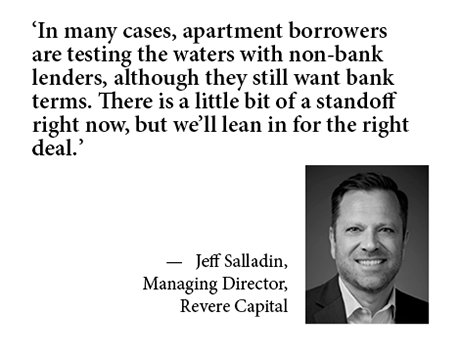For real estate investors who have an acquisition teed up or who need to refinance, the prospects of finding debt today are arguably the bleakest they have been since the financial crisis 15 years ago.
Higher interest rates and concerns over growing distress convinced banks and other lenders to move to the sidelines several months ago, thwarting commercial real estate investment sales. In turn, that is fueling broad uncertainty over what properties are really worth, which only begets more unease among banks.
But private debt funds, which typically provide short-term rate bridge loans, are more likely to make deals when banks will not, says Jeff Salladin, a managing director with Dallas-based debt fund Revere Capital. That’s because debt funds like Revere raise capital from sophisticated investors to fund their loans, he says, while banks rely on deposits. That subjects banks to stringent regulatory oversight, which is especially intense in today’s debt climate.
“All investors dislike uncertainty, and banks are investors by another definition,” states Salladin, who oversees real estate lending for Revere. “As a result, we could be in the first inning of a golden era for debt funds like ourselves, because we’re more flexible in way banks can’t be.”
Exercising Caution
That flexibility still comes with a heavy dose of discipline. When Revere would begin to assess whether to fund a deal a year ago, its loan-to-value (LTV) starting point was 70 percent, Salladin says. Today that starting point is 60 percent. The lender then adjusts the amount of leverage depending on the borrower’s experience and financial standing, property type, location and market rent growth projections, to name a few metrics.
In some cases, however, borrowers are much like sellers. They insist on receiving a loan of 70 percent of what they think the property is worth, which often reflects the lending environment from a year or so ago, he adds.
“We may make a conscious decision to go a little higher on LTV to meet that borrower, or we might stay at 60 percent,” Salladin explains. “The borrower may then decide to sit on the deal for a while or go to someone else. But that is the bid-ask spread and moment of uncertainty that we need to overcome.”
Revere is hunting for deals across retail, multifamily, office and hotel categories, and it recently provided debt at 45 percent LTV for land, a property type for which lenders have traditionally provided less leverage. Revere is currently closing a 64 percent LTV industrial deal. Multifamily deals have become more difficult, he says, but Revere continues to see opportunities cross its desk.
“In many cases, apartment borrowers are testing the waters with non-bank lenders, although they still want bank terms,” Salladin reports. “There is a little bit of a standoff right now, but we’ll lean in for the right deal.”
Manufacturing Certainty
Meanwhile, with the commercial mortgage-backed securities (CMBS) market all but closed, owners of stabilized office assets who have low-interest rate CMBS loans nearing term are hunting for short-term financing to buy time until the lenders start doing business again, he observes. But office owners who have seen their property values slide will likely need to seek extensions and, failing that, try to supplement a bridge loan with mezzanine or preferred equity financing.
“We’ve seen some extensions, but borrowers don’t know if their lender is on the bad bank list and therefore can’t extend,” he confides. “Banks don’t like to advertise that information.”
The tough financing environment has also opened opportunities to purchase loans at a discount, Salladin says. Such deals can provide a little more clarity, he suggests, and recently, Revere was considering whether to buy three apartment loans. At the same time, the firm is not interested in buying loans with the intent of owning the underlying properties, he stresses.
“If we’re going to buy a loan that matures in six months at 93 cents on the dollar, we want the borrower to be motivated to figure out their situation and succeed,” Salladin declares. “That’s one way to manufacture some certainty.”
For all the financial turbulence at the moment, the market has yet to tumble into the type of morass experienced during the financial crisis, he notes. “Back then, everyone was in the same boat — nobody knew what properties were worth and borrowers were returning their properties to lenders,” Salladin recalls. “But right now, some investors are finding ways to withstand the market, including by coming to us.”
— By Joe Gose. Revere Capital is a content partner of REBusinessOnline. For more information about the content partner program, click here.


